Forum 2000 Conference with Three FNF Panel Discussions
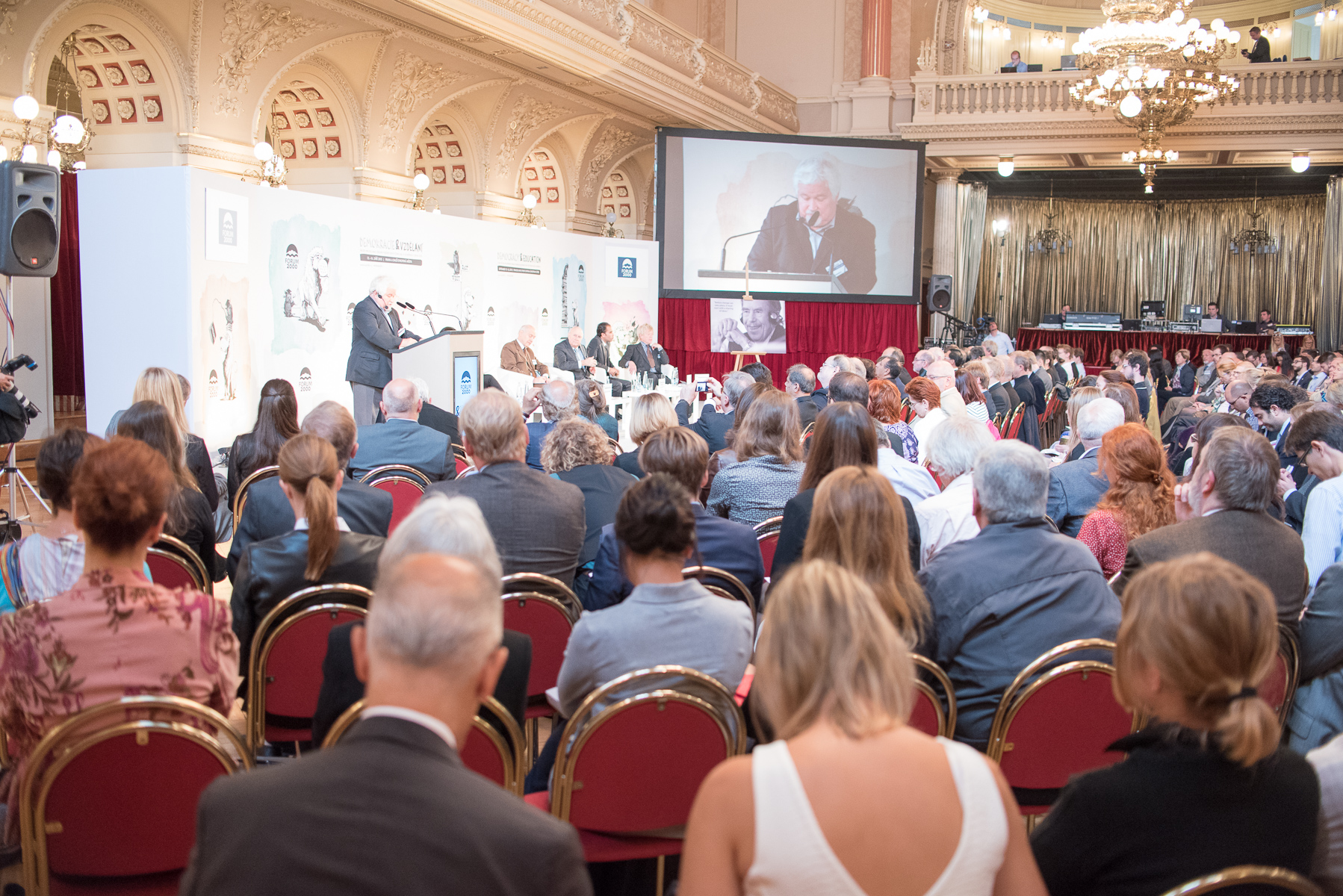
Forum 2000 Opening Ceremony
Friedrich Naumann Foundation for Freedom (“FNF”) has been supporting and participating in the “Forum 2000” conference in Prague, Czech Republic for almost a decade now. The focus of the 19th edition of the Forum 2000 conference was on “Democracy and Education”. This year during 13-15 September, two FNF offices participated in the conference, the Regional Office for East and Southeast Europe (FNF ESEE) and the Prague Office of FNF, part of the Regional Office of FNF Europe. Overall, at the conference there were three FNF events; one working breakfast on the “Challenges of Brain Drain”, supported by FNF ESEE, and two panel discussions supported by FNF Prague Office - “Democratic Education: Freedom to Think, Freedom to Learn" and "Reform or Perish". The FNF panels addressed three of the five thematic areas of this edition of the conference, those dealing with different aspects of democracy and education: Education Towards Prosperity; Education, Citizenship and Values; and the Changing Role of Education.
Education Towards Prosperity:“The Challenge of Brain Drain” Panel
The working breakfast on Brain Drain addressed a global phenomenon with major implications and tried to view this trend from both positive and negative perspectives. On the one hand, the free movement of talented people to where opportunities are, today easier than ever, is a fantastic way to fulfil individual dreams and even solve pressing social issues such as unemployment. On the other hand, it sucks vital resources from countries that can least afford it and thus, arguably, contributes to perpetuating and increasing global inequality. Discussions addressed issues such as “How does brain drain affect societies and economies”? and “Is democratic governance affected by brain drain?”.
A recording of the whole working breakfast can be found here:
A special video infographics, part of the series “FreedomGraph” of FNF ESEE, was screened at the beginning of the panel discussion on “Skilled Migration and Brain Drain”, setting the ground for fruitful discussions.
The panel discussion was moderated by Dr Rainer Adam, Regional Director of FNF ESEE, and had four distinguished panellists: Sandra Švaljek, Krassen Stanchev, Bogdan Patru and Surendra Munshi.
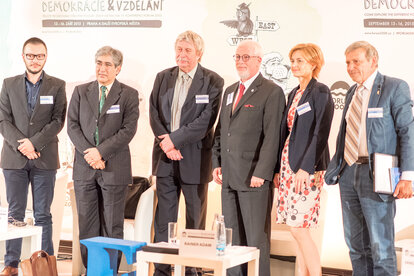
From left to right: Bogdan Patru, Surendra Munshi, Tomáš Vrba, Rainer Adam, Sandra Švaljek, Krassen Stanchev
Sandra Švaljek is a Senior Research Associate at the Institute of Economics in Zagreb, where she served as Director from 2005-2013. Between 2013 and March 2015 she was Deputy Mayor of the City of Zagreb in charge of economic and urban development projects and Acting Mayor from October 2014 to March 2015. Another panellist was Krassen Stanchev, a long-term partner of FNF. He is an Associate professor at Sofia University, CEO of KC 2 Ltd. and Board Chairman, Founder and Former CEO of the Institute for Market Economics, Bulgaria’s first independent and free market think-thank. The third panellist was Bogdan Patru from Romania, an EU Affairs & Strategy Director and a founding member of Smartlink Communications. In 2014, Mr. Patru was appointed EU Affairs Adviser at the Romanian Presidential Administration. The final panel speaker was Surendra Munshi from India, a Professor of Sociology at the Indian Institute of Management in Calcutta and a Member of the Forum 2000 Foundation Programme Council.
The moderator, Dr Adam, involved the audience by conducting a short survey on the spot consisting of three questions: 1. “Does the brain drain have a negative effect on the modernization process in the countries of origin?”, 2. “Does the quality of education and the universities influence the migration of students and graduates?”, 3. “Are restrictions on the freedom of movement in the EU required in order to reduce the migration of highly skilled persons?”. The first question resulted in more or less equal response: 24 people in favour, 21 against. Meanwhile, the second question provoked a clear majority: 35 people voted yes, while only 8 chose no. The third question received a 100% no vote.
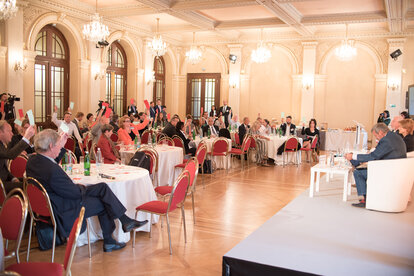
“The Challenge of Brain Drain” Panel
Education, Citizenship and Values: “Democratic Education: Freedom to Think, Freedom to Learn” Panel
The panel discussion on “Democratic Education: Freedom to Think, Freedom to Learn”, supported by FNF Prague, focused on the different, even contradictory, views about the amount of democracy in education. According to some, most children are born with an exceptional talent of some kind but this talent is mostly suppressed during the traditional education process. To counter this, it is argued that children should have - from an early age - an opportunity to make important choices concerning their education. In some alternative systems, children even choose or fire their teachers and collectively run their schools. Some contend that if children live according to democratic principles during their education, it fosters their natural talent and creativity. In addition, they are naturally learning democratic decision-making values about freedom and democratic governance by experience. Discussions covered the following questions: “Can more “democratic” education strengthen democracy itself?” and “Can democratic education help overcome increasing social, ethnic, and religious tensions within today’s societies?”. Panellists included Ivan M. Havel (Czech Republic), Oleg Derevianko (Ukraine), and Parth J. Shah (India). It was moderated by Leila Alieva (Azerbaijan).
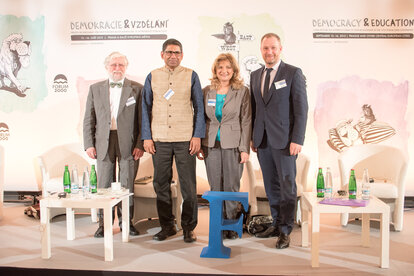
Ivan M. Havel, Parth J. Shah, Leila Alieva , Oleg Derevianko
You can find an entire recording of the event here:
Changing Role of Education: “Reform of Perish” Panel
“Reform of Perish” PanelThe third FNF panel, “Reform of Perish”, with the support of FNF Prague, discussed how and whether the traditional educational models should be reformed in order to be more adequately meet the needs of the 21st century. Education is increasingly seen as the key to economic prosperity and the general success of countries. Educational systems around the world are therefore undergoing a series of reforms, perhaps even experiments. Voucher reforms in Lithuania and Sweden are among such examples. Some of the questions discussed were: “What major issues need to be addressed in today’s prevailing educational system?”, “What are the key reforms currently taking place in education systems around the world?, “Why are they usually controversial?”. The speakers were Gintaras Steponavicius (Lithuania), Vaclav Hampl (Czech Republic), Parth J. Shah (India).
Stay tuned for a series of more articles, recordings and video interviews from the speakers.
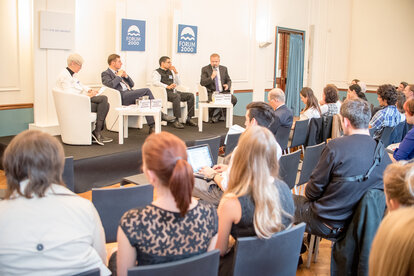
“Reform of Perish” Panel
The events were part of the global FNF initiative “Freedom Week 2015”. In the region of East and Southeast Europe there were more than 15 events in 8 cities in 6 offices of the Foundation, all promoting FNF contributions to Freedom.
Find the photos from Forum 2000 conference here: